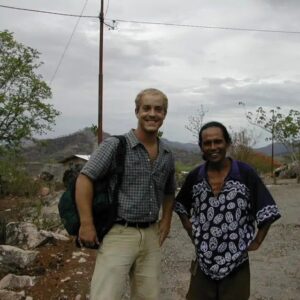 My experiences have taught me that while U.S. foreign assistance is often criticized and complicated by political motives, it can also be a powerful catalyst for positive change when implemented with genuine community engagement and respect for local cultures.
My experiences have taught me that while U.S. foreign assistance is often criticized and complicated by political motives, it can also be a powerful catalyst for positive change when implemented with genuine community engagement and respect for local cultures.
By Dan Baker
Many discover during Peace Corps service a calling toward a career in international relations, policy, humanitarian assistance, and relief work. Indeed, Peace Corps has produced thousands, if not tens of thousands, of foreign service officers and development practitioners, whose work is enhanced by hard skills gained from Peace Corps, including language and intercultural skills, project management, resource identification, interpersonal relations, and grit. The promise, opportunity and impact that these individuals will contribute towards making America stronger and more relevant on the global stage has been kicked out from beneath their feet by recent decisions. Here is our organization’s statement on these recent changes:
It is the position of National Peace Corps Association that, while it is the prerogative of any new Administration to review U.S. foreign policy and national security programs to ensure alignment with its agenda and priorities, the current non-surgical freeze is jeopardizing U.S. safety, strength, and prosperity. Our country’s geopolitical rivals are celebrating while the United States loses credibility every day that our commitments go unmet.
Risks of these decisions are vast, and include stepping back from close allies like Taiwan and Jordan, preventing ISIS from reconstituting in Syria, engaging Pacific Island nations to counter China’s growing influence, and global health initiatives that prevent the spread of disease to our shores.
America’s rivals will assuredly take full advantage of this freeze, if unchecked, to grow their global influence at a moment when America needs to continue to demonstrate leadership on the global stage.
My experiences have taught me that while U.S. foreign assistance is often criticized and complicated by political motives, it can also be a powerful catalyst for positive change when implemented with genuine community engagement and respect for local cultures.
My personal relationship with U.S. foreign assistance over the past 25 years is nuanced; I champion international assistance programs, but do not discount the need for reform. It has long been my feeling that foreign assistance needed to be more like Peace Corps, with a grassroots approach to building local capacity, sustainability and independence. Happily, I’ve seen great progress in that direction.
In the early stages of my career as a water sanitation Volunteer in Bolivia, I witnessed remarkable work that provided access to education, clean water and healthcare. There were also wonderful projects that significantly improved environmental conservation and commodity markets in the country. However, I was also struck by the intense competition among development implementers for USAID funding. I witnessed backstabbing among implementers and saw first-hand how USAID resources were tethered to a failed, American-imposed agricultural strategy known as alternative development, ostensibly aimed at eradicating coca production. Unfortunately, this antiquated top-down approach often deepened local skepticism and dependence on U.S. assistance. My Bolivian hosts had valid reasons for distrusting American intervention.
A pivotal moment for me came when I arrived in Timor-Leste, a nascent nation with a painful history. My host family, neighbors, and colleagues had never encountered an American before, yet they welcomed me with a warmth and kindness that left a lasting impression. This generosity was surprising, given the dark chapter where our government, led by Henry Kissinger, played a role in the illegal annexation of their country, supplying the very weapons that facilitated a brutal 24-year occupation. During that time, food aid was scarce, and many Timorese were forced to hide in the mountains from the relentless Indonesian military. However, amidst this turmoil, I learned that Australians and the U.N. had delivered food aid to the beleaguered population, often branded with the American flag and labeled “from the American people.” This food helped to keep many alive, and the credit was only directed to the flag that appeared on the food.
As a Peace Corps Volunteer Timor-Leste, I witnessed what I can only describe as a nation-building success miracle. The journey for this country is ongoing and certainly far from a fairy tale. Through the tireless efforts of local leadership, there arose from the ashes strong local capacity, access to healthcare and education, and a resilient economy. Empowering foreign assistance matters.
The greatest waste I experienced with USAID came not from within, but due to changing political priorities. While running a USAID project in Guatemala aimed at countering political corruption by engaging young politically minded youth, a promising program was slashed because a new administration no longer wanted government aid to go to Guatemala. It is my experience that changing political whims in foreign aid generates significantly more waste of time and resources than anything else. Incalculable is the damage that unfulfilled commitments do to our reputation as a reliable partner.
In recent years, my hope for seeing more local and youth-led development support began to materialize. The USAID “localization” strategy began to take shape, with a focus on local partnerships to make more efficient and sustainable use of foreign assistance dollars. This is the development approach practiced for 64 years by Peace Corps.
Finally, I have simply never met more intelligent, committed and passionate advocates for international health, prosperity and security than those who work with USAID and with their implementers, and I am proud that so many of these individuals got their start in the Peace Corps.
During ‘Peace Corps Week’ I hope this community will join me in rallying around these immeasurably important efforts and RPCV patriots. Help us celebrate these heroes and the role that Peace Corps plays in catalyzing change around the world.
Dan Baker (Bolivia 1999–2002), (Timor Leste 2002–2003) is President and CEO of National Peace Corps Association